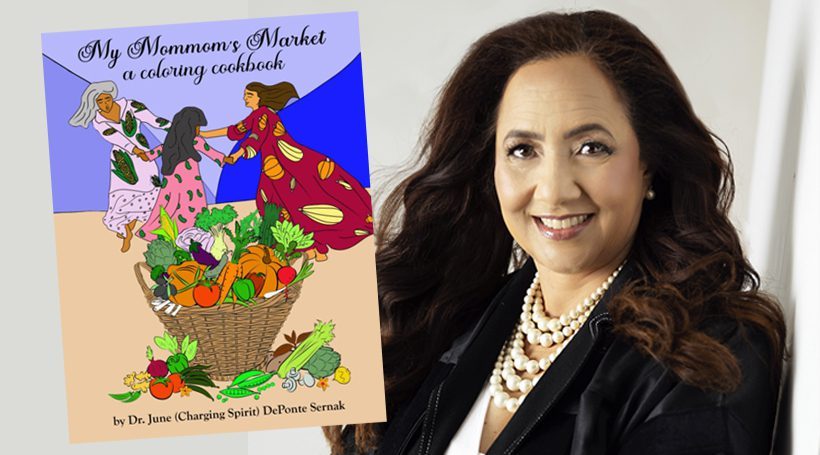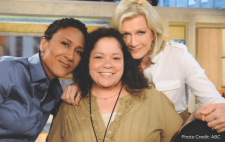Bushels of corn, cartons of blueberries and baskets of tomatoes filled June DePonte Sernak’s childhood kitchen. That’s why it was a surprise that she qualified for government cheese, the pungent processed food given to welfare recipients. The announcement came from her high school guidance counselor, the same person who told her she wasn’t college material.
“I was mortified,” says DePonte Sernak, “but apparently, it was a Native American thing back then. You can get a vat of peanut butter and a block of government cheese. I didn’t understand it because we had food, lots of fresh produce. It was not until I spoke with my older cousins years later that I found out they did the same thing to them. Being a minority family, you were designated for the secretarial track and for government cheese. It was a series of what we would today call microaggressions.”
As it turns out, the guidance counselor was wrong. Not only would DePonte Sernak attend college, but she would earn advanced degrees. Her diverse background would factor heavily in her future career and even inspire a creative endeavor – a coloring cookbook celebrating her native heritage.
“When I was younger, I thought that everybody’s family looked like mine with different skin colors and varied hair textures,” she says. “Even as a young child, though, I could see that race was at the forefront. That prompted a nagging concern. Because I am the daughter of a Black mother and Native American father with a set of Italian grandparents, I wondered what would happen if there was segregation and I had to choose where I go? I spent my life feeling like I was sitting on the fence. People are proud of their heritage, and rightly so, but when you’re mixed, there’s no flag for that.”
DePonte Sernak grew up in Burlington City, splitting time between her home and 2 sets of grandparents. “My grandmother on my mom’s side lived in the center of the block and everybody lived within a few miles,” she says. “That’s where my cousins and I would gather on the weekends to watch TV. My mother was one of 12 children, so there was always family around.”
Her grandparents on her dad’s side lived in Haddonfield. “They had a beautiful house with a garage that they turned into a produce market,” says DePonte Sernak. “We’re in New Jersey, the Garden State, so you’ve got corn, tomatoes, blueberries, strawberries and peaches. My dad was a machinist, and he would help at the market on weekends. Then he would bring all this fresh produce home and my mom would cook it. We didn’t know what it was like to have something frozen. Everything was fresh and made from scratch. Food not only sustained us, it was part of gathering and celebrating as a family.”
But amid a blissful childhood, a dark shadow emerged. DePonte Sernak’s father had a heart attack at just age 35. It would be the first of 7, the last of which eventually took him when he was 60. Her mother started cooking specifically for heart health. The fresh vegetables and fruits from the market became even more important.
The family tradition of fresh, healthy food followed DePonte Sernak to college. “My mom loaded me up with food and my college roommates loved her recipes,” she says.
It would be a few years though before DePonte Sernak would have the “aha” moment that preceded her creative endeavor.
Her priority was education. She earned a BA in Marketing from Montclair State University, an MBA in Management from Strayer University, and an EdD in Organizational Leadership from Wilmington University. She worked for the American Red Cross as an executive director, and for Rowan University as Dean of Lifelong Learning – both jobs that caused her to grow her skillset. Now as Statewide Multicultural Diversity Leadership Officer for the Center for Family Services, DePonte Sernak is tapping into her diverse roots.
“I’ve had the honor for almost 2 years now to present cultural competency education to agencies throughout the state of New Jersey,” she says. “You can’t have that conversation without discussing social disparities. You start to realize how these inequities, like food insecurity, are affecting people. Several organizations like Oaks Integrated Care and the Food Bank of South Jersey provide fresh fruit and vegetables in underserved communities. Yet many families are unsure of how to prepare this food. They may not know the benefits of their nutritional value.”
“It’s not their fault,” says DePonte Sernak. “They’ve grown up in a food desert with the tendency to choose quick and cheap fast food over healthier alternatives.”
When she shared these challenges in passing with a friend, that was her “aha” moment. Her friend asked the pivotal question: “Do you still have your mom’s recipes?” She then suggested publishing the recipes as a kid’s coloring book so the whole family could get involved.
That was the idea behind “My Mommom’s Market.” The coloring cookbook features recipes from DePonte Sernak’s grandmother that were adjusted to be heart-healthy by her mother. The recipes are her childhood favorites, including strawberry shortcake with homemade biscuits. There are 10 in all, each presented with an illustration and writeup about the recipe’s origin and cultural connection.
“I have an opportunity to share about the 3 sisters, which in the Native American culture are squash, beans and corn,” says DePonte Sernak. “The clan mothers of the tribe say they nurture each other like family when planted together.”
The publication honors her heritage with a byline that includes her Native American name, Charging Spirit. DePonte Sernak is a member of the Powhatan Renape and Nanticoke Lenni-Lenape Nations.
“I’m sure it sounds like a fable, but it all has fallen into place with this book,” says DePonte Sernak. This is a tribute to Native American history and my family, including my favorite childhood memories. We made this into a coloring book to bring families together to make their own memories in good health from the produce grown in the Garden State.”
“Food is a great equalizer,” adds DePonte Sernak. “We have 9 million people in the state of New Jersey that speak over 50 languages. I’m hoping this book inspires people to learn a little bit more about Native American culture in New Jersey. I hope it brings people joy, and they take these recipes and make them their own.”














